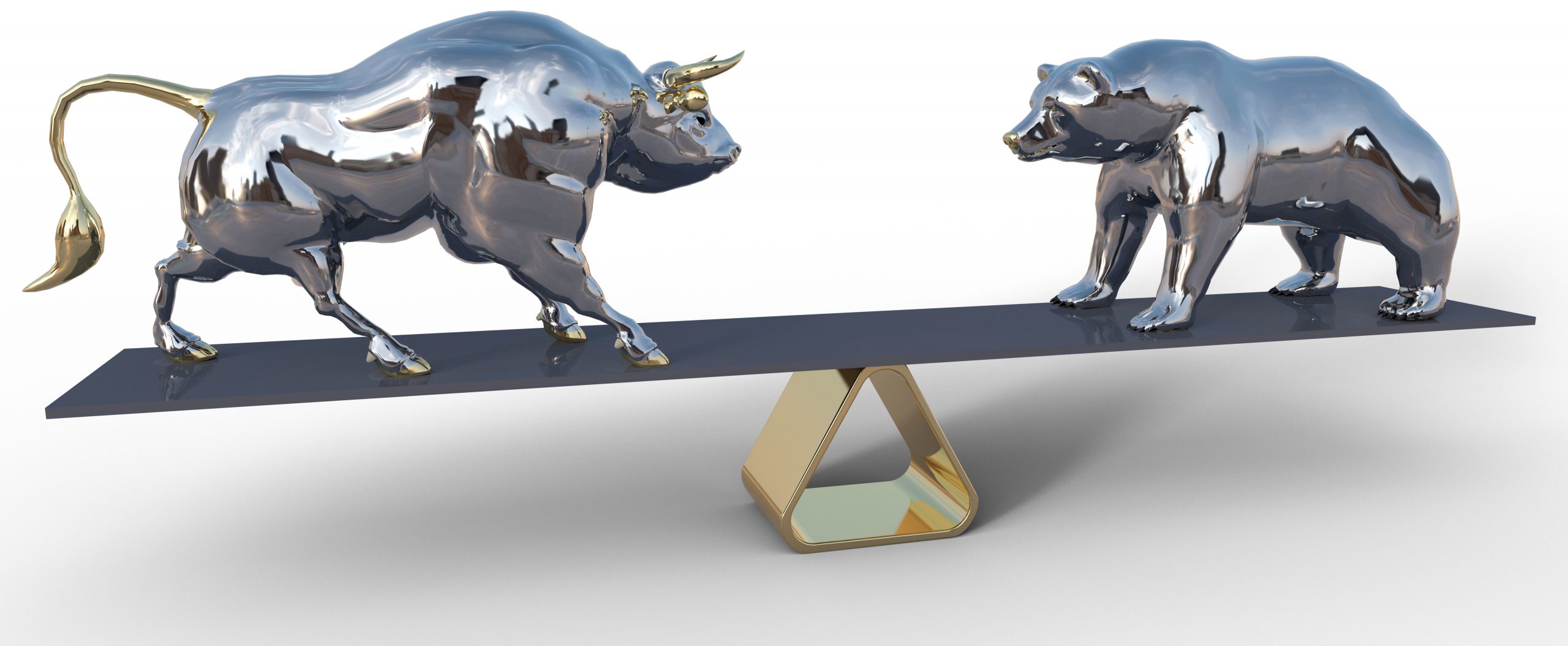
(Please enjoy this updated version of my weekly commentary from the POWR Value newsletter).
The starting point for today’s discussion is to tackle my fundamental review of the bull and bear case which was shared in detail this Wednesday 5/4 for the Platinum Members monthly webinar (watch it here >).
Watching this 30 minute presentation is time well spent. But if you are short on time right now, then here is the summary…
Both bull and bear market outcomes are possible from here. Sometimes it’s easier to see the reasons to be bearish because fear is a much stronger motivator than greed.
And in that camp we have high inflation + hawkish fed + bad market sentiment = a nasty elixir that could devolve into bear market.
On the other hand, history shows that it is much harder than you imagine to create a recession and bear market and that the bull wins out the majority of the time. That is why we stay in bullish conditions 5-6X more than bearish conditions over our lifetimes.
Summing it up, I think the case for bull market is stronger than bear market. The main reason for that is that there is a lot of one time “nonsense” inside the -1.4% GDP read for Q1 that does not really tell the story of the economy’s health.
That is why corporate leaders are in general raising guidance for the rest of the year after their Q1 earnings reports. These business executives are adept at knowing the pulse of their customers.
And if they saw any whiffs of weakness, they would say so in their outlooks to lower guidance and thus make it easier to beat estimates going into the next quarterly report.
On top of that you have the well respected GDPNow model from the Atlanta Fed which is currently flashing a +2.2% reading for Q2 GDP. The Blue Chip Consensus panel of economists is a few ticks higher at +2.8%.
Adding up these points is to refute the idea of a looming recession which is the main cause of bear markets.
Unfortunately devolving into bear market conditions down the road is quite possible because sometimes the leading cause of bear markets is not a weak economy…but rather weak stock market which acts as a catalyst to slow the economy in the future.
This one is a little bit of a brain teaser at first. So read it twice to make sure that the idea sinks in.
The original view of the market was that investors as a group were GREAT prognosticators of the future. That they often predicted recessions 4-6 months in advance by selling off during good conditions only for the evidence of the recession to unveil itself down the road.
Meaning that a near term correction during good times was often times a leading indicator of recession and bear market down the road.
More and more evidence shows this is not really the case. Perhaps here is the more logical sequence of events…
The market can sell off at any time for any reason. And typically bull markets endure 1-2 harsh corrections per year before bouncing back on their way to new highs.
However, sometimes those corrections last a bit longer. And put more strain on investor psyche. Which starts to give investors a pessimistic view of what the future holds.
In particular, the people who run the largest corporates are also amongst the wealthiest in the country. No doubt they have a high % of their net worth tied up in the stock market and are well aware of poor stock price conditions.
Thus, the longer these downturns go on…the more damage they see in their portfolio…the more pessimistic they may become on their business outlook.
Thus, it is when those pessimistic views from the stock market start effecting their business decisions…like lowering spending or delaying major investments in company expansion…that is what starts to chip away at economic growth…perhaps enough to cause a recession.
The point is that poor market conditions can very well be the catalyst behind future recessions and bear markets. And indeed this nasty start to 2022 could be just one of those kinds of market conditions.
When you add it all up you still have to appreciate that bull market odds are higher than bear market…but the latter is a very possible outcome which puts us in “wait and see” mode.
This is what leads to 2 divergent paths for the market from here. Let’s quickly spell them out along with the game plan for how to invest in each environment.
Bear Market Path: Drop Below 3,855
I sense that there will be serious support at 4,000 leading to a bounce. And yes, it may be the lasting bounce and we never test lower again. But the true line of demarcation between bull and bear is 3,855…exactly 20% under the all time highs.
If we break below with gusto, and keep heading lower, then we are indeed in bear market territory and that will likely extend to the average 34% decline found in bear markets…maybe a little further given that stocks did achieve higher than normal valuations during this bull cycle and thus more fat may need to be trimmed before bottom is found.
In this scenario investors will want to get more defensive on the break below 3,855. That starts by selling all aggressive stock positions (smaller cap, higher beta, cyclical industries) as they will come down the most.
Storing that extra money in cash is fine until you want to start picking your spots near bottom. However, more speculative investors may want to consider shorting the market with inverse ETFs to make money as the market heads lower.
We will not be doing that in the POWR Value service because it is outside the charter of the publication, which is to always be in the best value stocks…but like I am doing now I will give advice on how you can do that on your own even if not “official” positions in the portfolio.
On the other hand, my Reitmeister Total Return service is precisely built for that bear market flexibility. So if you do not have access to the service, then learn more about it here.
Now let’s consider the flip side of that investment coin…
Bull Market Path: Stay Above 3,855
As stated earlier, this is the more likely path given the economic evidence in hand. However, when you have a correction this deep and going on for this long, then it will likely demand a glorious finish. The kind of finale that shakes all investors to their core.
Perhaps that just happens with a fight over 4,000 where major support will be found. Yet it is not hard to imagine a drop all the way down to the border of bear market territory at 3,855.
That is the kind of drop that strikes fear in the heart of investors that compels a total “I give up” capitulation. And in the dawn of that surrender is a glorious capitulation rally that marks the end of the correction and resumption of the bull market.
In this case you just hold on to the market like a rodeo rider. No matter how much it bucks and tries to throw you off…the tighter you hold on to still be there when that capitulation rally comes.
That’s because that rally will be fast and furious to the upside. Therefore, to be in cash at that time…or net short…is to destroy your entire year as a 10%+ bounce in just a weeks time is not out of the question.
In this case you simply hold onto your favorite stocks with a healthy blend of attractive growth and tremendous upside to fair value. Those will bounce the most as investors rush back in. And yes, these are exactly the kinds of stocks we have inside POWR Value.
I know it’s not easy reading this commentary as both the bullish and bearish outcomes are such realistic possibilities yet 180 degrees different from each other. But truly there is no better advice I can give but “wait and see” as we have the right contingency plans in place for when that moment of truth comes.
I promise to do my best to help us get through this trying time and onto calmer shores.
Stay tuned for what comes next…
If you’d like to see more top value stocks, then you should check out our free special report:
What makes these stocks great additions to any portfolio?
First, because they are all undervalued companies with exciting upside potential.
But even more important, is that they are all A rated Strong Buys according to our coveted POWR Ratings system. Yes, that same system where top-rated stocks have averaged a +31.10% annual return.
Click below now to see these 7 stellar value stocks with the right stuff to outperform in the coming months.

SPY shares closed at $411.34 on Friday, down $-2.47 (-0.60%). Year-to-date, SPY has declined -13.13%, versus a % rise in the benchmark S&P 500 index during the same period.
About the Author: Steve Reitmeister

Steve is better known to the StockNews audience as “Reity”. Not only is he the CEO of the firm, but he also shares his 40 years of investment experience in the Reitmeister Total Return portfolio. Learn more about Reity’s background, along with links to his most recent articles and stock picks.
Bull vs. Bear Market? StockNews.com






